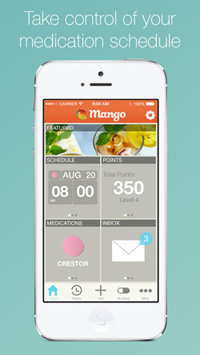 |
| Mango Health's smartphone app for drug adherence--Courtesy of Mango Health |
Mango Health has already charted success for its mobile drug adherence program, centered on a smartphone app. But now, the company is eyeing new territory: a patient's wrist.
The San Francisco, CA-based company is launching a new app on the Apple ($AAPL) Watch, sending reminders to users to take their meds and giving them graphic feedback on how well they're sticking to their drug regimens. It's one of the many companies--drugmakers included--trying to harness mobile technology to keep patients on their meds.
The move comes as Mango Health looks to expand its mobile drug adherence platform, armed with numbers from a yearlong clinical trial with one of the biggest hospital systems in the U.S., CEO Jason Oberfest told Tech Crunch blog.
Mango Health isn't revealing the name of its partner, but touts impressive numbers for its mobile app, which is targeted toward middle-aged women. One third of people who sign up for the app still come back to it after one year, and each customer averages 17.1 sessions per week--meaning that they're probably opening the app at least twice a day. More than 3/4 of monthly users come back to the app every day, according to the blog post.
If those visits translate into on-time refills, that means more sales for pharma and better outcomes for patients. A recent analysis in the Annals of Internal Medicine found that Americans are not sticking to their prescription meds, a problem that costs the U.S. health system between $100 billion and $289 billion each year, Reuters reports. "Drug adherence may not be sexy, but it's a $300 billion-a-year-problem," Oberfest told the news outlet in August.
Mango Health has some notable backers: Kleiner Perkins partner Bing Gordon and Zyna cofounder Mark Pincus funneling $8 million into the company's mobile drug adherence platform. Money is piling into drug adherence programs as pharma companies look for ways to show payers and doctors that they not only sell pills, but improve patients' health.
HealthPrize Technologies, for one, is using mobile and online interfaces to engage patients and inspire them to take their meds. In January, the company revealed study results showing more than half of patients who participated in the company's gamification efforts continued to fill their prescriptions and stayed with the programs over time. The company has partnered with drugmakers to roll out adherence games to patients using their meds.
"Patient engagement is really the Holy Grail in personal health, and we're making headway in making the patient experience more enjoyable. This is key in getting patients involved in an online and mobile program," HealthPrize's Chief Medical Officer Katrina Firlik told FiercePharmaMarketing.
- read the blog post